Navigate the World of Professional Reference Letters: 23 Templates for Success
Welcome to our website dedicated to Professional Reference Letters! We understand the significance of reference letters in various professional contexts and aim to provide you with valuable information, guidelines, and resources to effectively navigate the world of reference letters. Whether you are a requester seeking guidance on how to obtain strong reference letters or a writer looking for tips to craft impactful letters, we have you covered. Our comprehensive collection of content offers insights into the different types of reference letters, their usage, dos and don’ts, writing tips, and more. We believe that mastering the art of reference letters can greatly enhance your professional opportunities and create a positive impression on employers, admissions committees, and decision-makers. So, let’s dive in and unlock the power of professional reference letters together!
Tips for Writing a Strong Reference Letter:
- Introduce Yourself: Begin by introducing yourself and your relationship to the individual you are recommending. Mention how long you have known them and in what capacity.
- Structure the Letter: Follow a clear and organized structure, including an introduction, body paragraphs, and a conclusion. Use paragraphs to address different aspects of the individual’s qualifications.
- Provide Context: Briefly explain the context in which you have observed the individual’s skills and abilities. This could be in a professional setting, academic environment, or any other relevant context.
- Highlight Key Strengths: Identify the individual’s key strengths and qualifications that make them a strong candidate for the opportunity at hand. Focus on specific skills, achievements, and experiences that are relevant to the purpose of the reference letter.
- Provide Examples: Support your claims with specific examples and anecdotes that demonstrate the individual’s abilities. Use concrete instances to illustrate their accomplishments, problem-solving skills, leadership qualities, or any other relevant attributes.
- Be Specific and Detailed: Avoid generalizations and be specific in your descriptions. Provide details about the individual’s contributions, projects they have undertaken, or challenges they have successfully tackled.
- Personalize the Letter: Tailor the reference letter to the specific opportunity or context. Highlight qualities or experiences that are most relevant and valuable for the recipient of the letter.
- Use Positive Language: Utilize positive and affirmative language throughout the letter. Emphasize the individual’s strengths, potential, and positive impact they have had in their respective roles.
- Avoid Bias: Be fair and objective in your assessment. Avoid any personal biases or irrelevant information that may detract from the credibility of the reference letter.
- Conclude with a Strong Endorsement: In the conclusion, summarize your recommendation and express your confidence in the individual’s abilities and potential for future success.
- Proofread and Edit: Before finalizing the letter, thoroughly proofread it for any grammatical or spelling errors. Ensure the letter is well-structured, coherent, and error-free.
Importance of Reference Letters
Reference letters hold immense importance in various professional contexts, playing a pivotal role in job applications, educational programs, and career advancements. These letters provide valuable insights into an individual’s skills, qualifications, character, and work ethic, serving as endorsements from reputable sources. In job applications, reference letters offer employers a glimpse into a candidate’s past performance, validating their abilities and confirming their suitability for a particular role. They provide credibility and independent perspectives that can greatly influence hiring decisions. Similarly, in educational programs, reference letters help admissions committees assess applicants’ academic potential, personal qualities, and potential contributions to the learning community. Reference letters also play a crucial role in career advancements by showcasing an individual’s accomplishments, leadership abilities, and professional growth, allowing employers to make informed decisions regarding promotions or new opportunities. Furthermore, reference letters can provide a competitive edge by differentiating applicants from their peers, reinforcing their qualifications, and establishing a positive professional reputation. Overall, reference letters serve as powerful tools that amplify an individual’s strengths and contribute to their overall professional success.
#1: Employment Letter:
An Employment Reference Letter is a document used to recommend an individual for employment based on their skills, qualifications, and work ethic. This is typically provided by a previous employer, supervisor, or colleague who can speak to the candidate’s performance and suitability for the desired position. The purpose of Employment is to provide prospective employers with valuable insights into the applicant’s abilities, character, and past work experiences, aiding them in making informed hiring decisions. It serves as a testimonial to the candidate’s professional competence and can significantly enhance their chances of securing employment opportunities.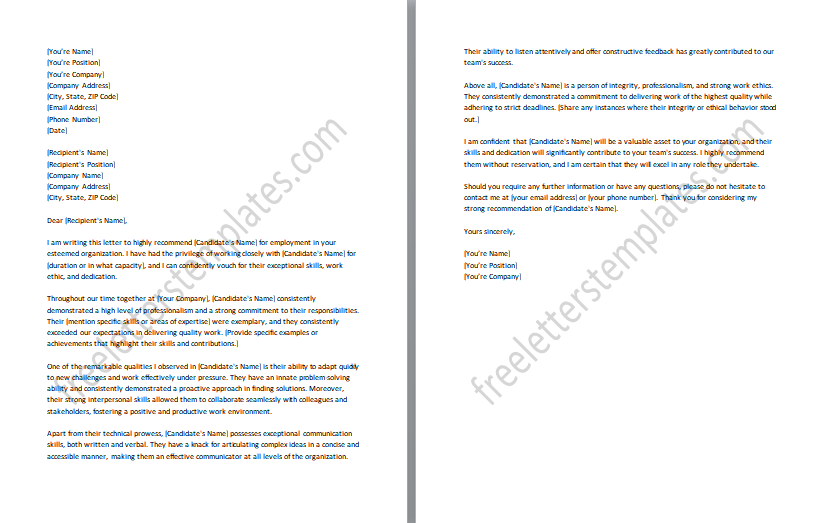
#2: Academic Reference:
An Academic Reference Letter is a powerful tool that helps students unlock educational opportunities and scholarships. It’s a personalized recommendation written by a teacher, professor, or academic advisor who knows the student well. This showcases the student’s academic achievements, strengths, and potential for growth. Its purpose is to provide valuable insights into the student’s character, work ethic, and intellectual abilities, helping selection committees and academic institutions make informed decisions. With an Academic students can shine a light on their academic prowess and increase their chances of getting accepted into their desired programs or securing scholarships that can shape their future.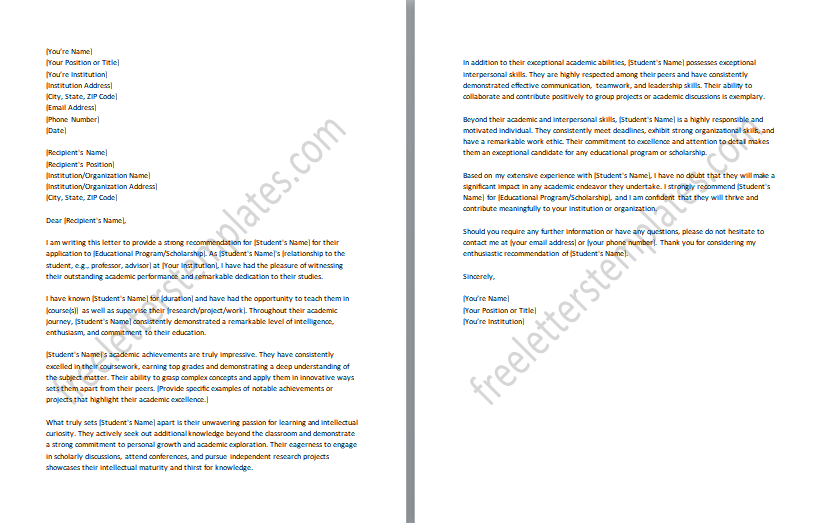
#3: Character Letter:
A Character Reference Letter is a heartfelt testimonial that speaks to an individual’s personal qualities, integrity, and moral character. The purpose of a Character is to provide a positive assessment of the individual’s character traits, highlighting their honesty, trustworthiness, compassion, and other admirable qualities. This goes beyond professional or academic accomplishments and focuses on the individual’s integrity and ability to positively impact those around them. Character is often requested for job applications, volunteer opportunities, legal proceedings, or any situation where a person’s character is under evaluation. They provide a sincere and genuine perspective on the person’s character, helping others gain a deeper understanding of their true nature and vouching for their reliability and moral values.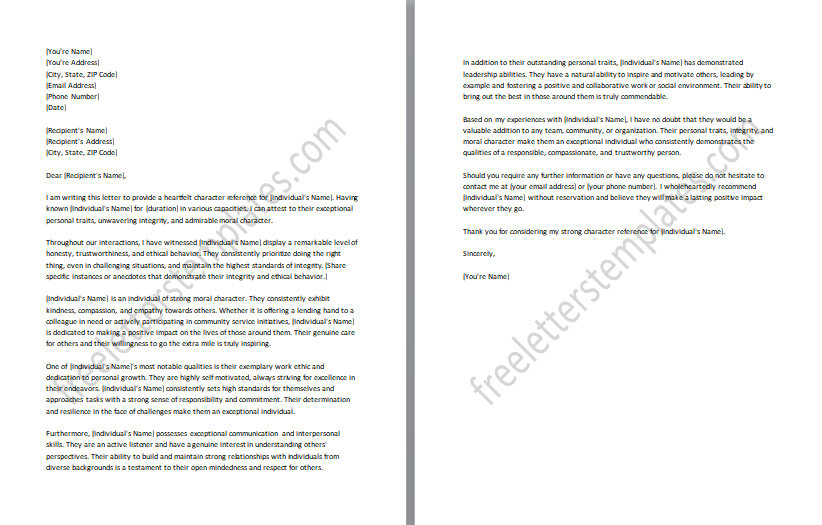
#4: Business Reference:
A Business Reference Letter is a powerful endorsement of a business or company’s professionalism, quality of service, or products. This is typically written by a satisfied customer, client, or business partner who has firsthand experience with the business and can attest to its merits. The purpose of a Business is to provide prospective clients, partners, or investors with a compelling testimonial about the excellence and reliability of the business. It highlights the business’s strengths, unique selling points, and track record of delivering exceptional results. A well-crafted Business can instill trust and confidence in the recipient, influencing their decision to engage with the business and potentially leading to new opportunities and partnerships. It serves as a valuable tool for businesses to showcase their reputation, credibility, and the positive impact they have had on their customers and clients.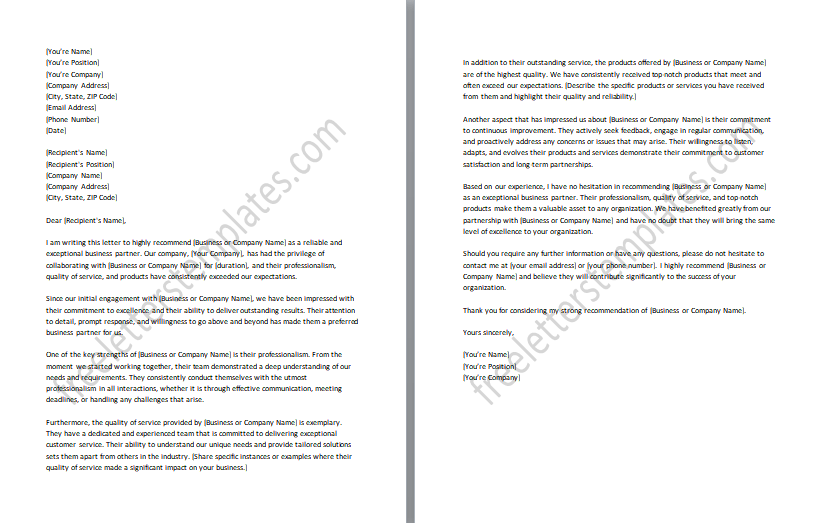
#5: Vendor Reference:
A Vendor Reference Letter is a valuable endorsement of a vendor or supplier based on their reliability, quality of goods, and exceptional customer service. This is typically written by a satisfied customer or client who has established a positive and mutually beneficial relationship with the vendor. It serves as a testimonial to the vendor’s professionalism, integrity, and ability to consistently meet or exceed expectations. A Vendor not only helps other potential clients make informed decisions but also recognizes and rewards the vendor for their exceptional performance. It fosters trust, promotes positive vendor relationships, and can even lead to increased business opportunities for the vendor in the form of referrals and recommendations.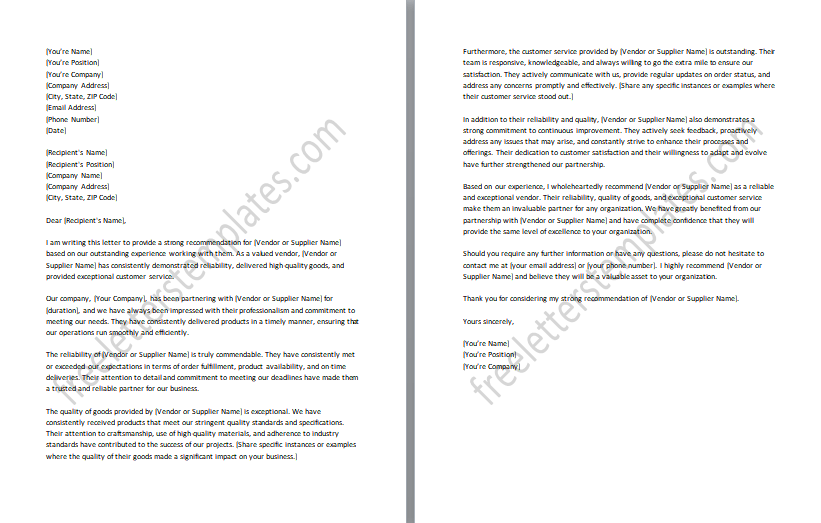
#6: Tenant Reference:
A Tenant Reference Letter is a valuable recommendation for a prospective tenant of a rental property. This is typically provided by a previous landlord, property manager, or neighbor who has had direct experience with the tenant. The purpose of a Tenant is to vouch for the tenant’s responsible behavior, financial stability, and cleanliness as a tenant. It provides insights into the tenant’s reliability in paying rent on time, maintaining the property in good condition, and being respectful towards neighbors and the community. A well-crafted Tenant can help landlords make informed decisions about potential tenants and minimize the risks associated with renting out their property. It serves as a testament to the tenant’s trustworthiness and suitability for the desired rental property, helping them stand out among other applicants and secure their desired living arrangements.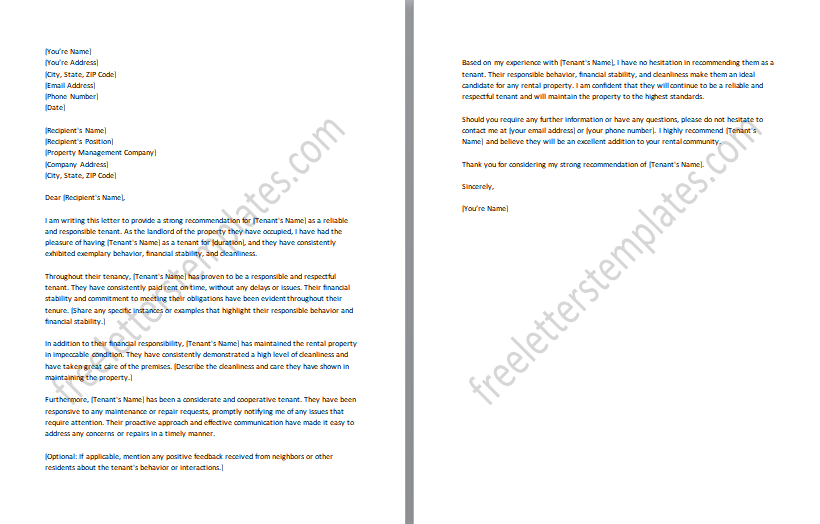
#7: Volunteer Letter:
A Volunteer Reference Letter is a heartfelt recommendation that acknowledges the dedication, skills, and contributions of an individual as a volunteer. It showcases their selflessness, passion, and the positive impact they have made in their volunteer role. This is written by a supervisor or fellow volunteer and provides valuable insights into their reliability, teamwork, leadership abilities, and adaptability. It not only honors their efforts but also serves as a valuable asset for future volunteer opportunities or job applications. A well-crafted Volunteer helps them stand out, demonstrating their commitment to community service and their ability to contribute meaningfully to any cause or organization.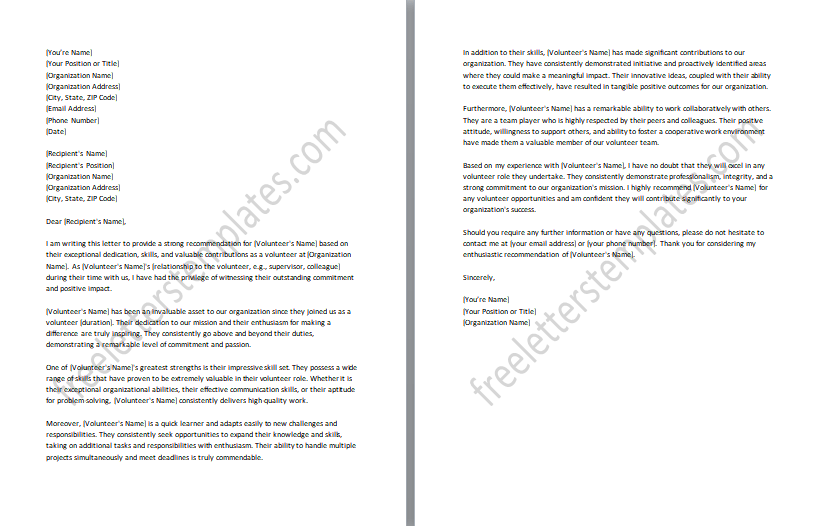
#8: Internship Reference:
An Internship Reference Letter is a testimonial that highlights the performance, skills, and attitude of an intern during their internship. This is typically written by a supervisor, mentor, or employer who has closely observed the intern’s work and progress. The purpose of an Internship is to provide feedback on the intern’s contributions, growth, and ability to meet or exceed expectations. It emphasizes their professionalism, work ethic, interpersonal skills, and willingness to learn. A well-crafted Internship can significantly enhance the intern’s credibility and prospects for future employment or educational opportunities. It serves as a valuable endorsement of their capabilities and potential as they transition into their chosen career path.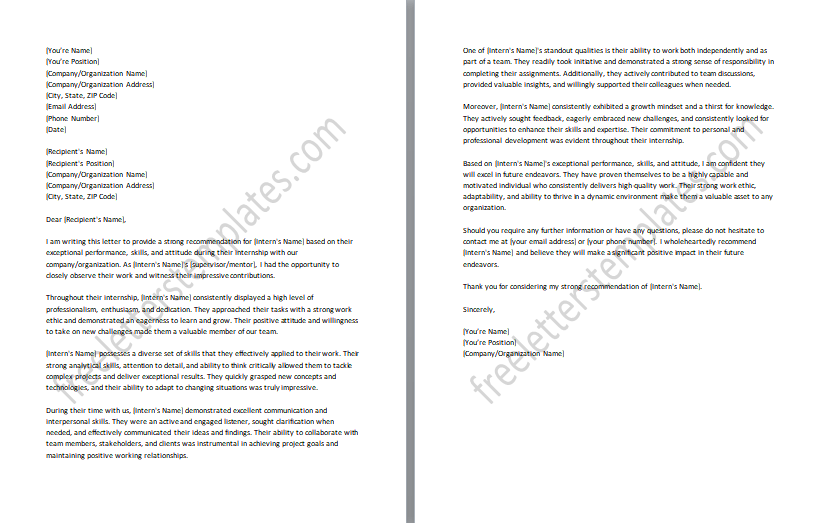
#9: Contractor Letter:
A Contractor Reference Letter is a recommendation that validates the competence, timeliness, and quality of work of a contractor. This is typically written by a client or project manager who has firsthand experience working with the contractor. It highlights their ability to meet project deadlines, deliver high-quality workmanship, and effectively communicate with clients and team members. A well-crafted Contractor can enhance the contractor’s reputation, build trust with potential clients, and increase their chances of securing new projects or contracts. It serves as a testament to their skills, integrity, and commitment to customer satisfaction.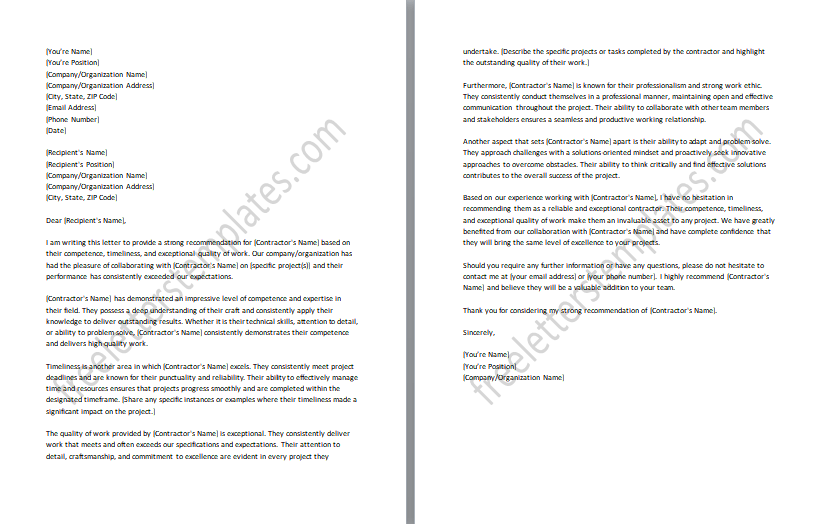
#10: Professional Membership Reference:
A Professional Membership Reference Letter supports an individual’s application for membership in a professional organization. It highlights their qualifications, expertise, and commitment to professional development. This is written by a current member or a leader in the organization and emphasizes the applicant’s achievements, contributions to the field, and adherence to professional standards. It serves as a strong endorsement of their credibility and potential contributions to the organization. A well-crafted Professional Membership strengthens their application, showcasing their alignment with the organization’s mission and values. It demonstrates the applicant’s dedication to continuous learning, networking, and advancing their professional career within the community of like-minded professionals.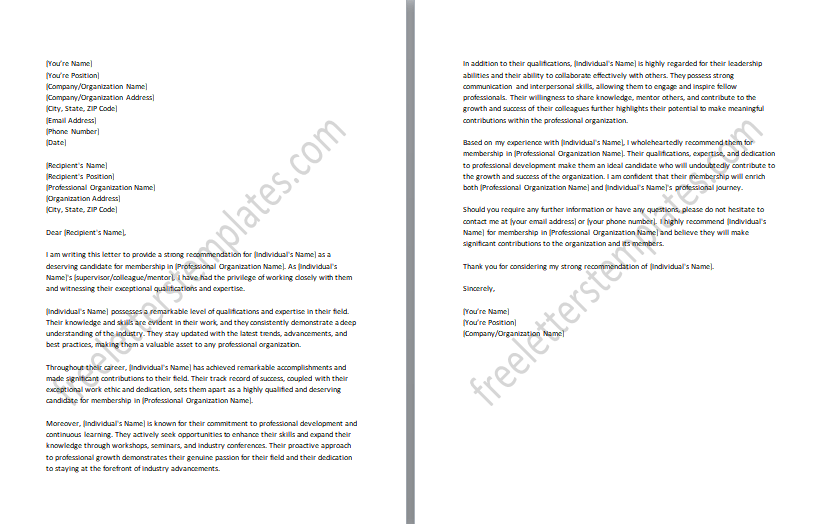
#11: Professional Service Letter:
A Professional Service Reference Letter is a recommendation that highlights the competence, professionalism, and client satisfaction of a service provider such as a lawyer, accountant, or consultant. This is typically written by a satisfied client who has firsthand experience working with the professional. It emphasizes their professionalism, effective communication, and problem-solving skills. A well-crafted Professional Service can enhance the service provider’s reputation, attract new clients, and demonstrate their commitment to delivering exceptional results.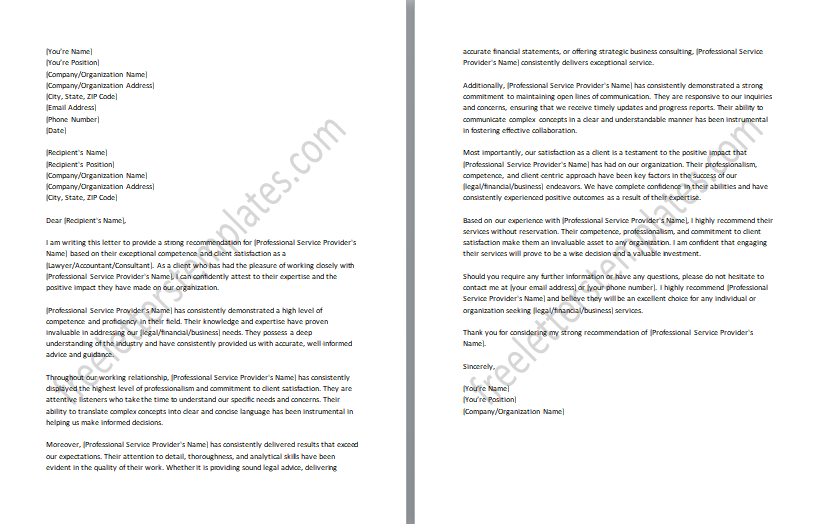
#12: Research Reference:
A Research Reference Letter is a recommendation that highlights the expertise, contributions, and impact of a researcher or scientist. This is typically written by a colleague, supervisor, or collaborator who can speak to the individual’s research capabilities and achievements. The purpose of Research is to provide insight into the researcher’s knowledge, methodology, and significant contributions to their field. It emphasizes their publications, research findings, and their ability to generate new knowledge and advancements. A well-crafted Research can strengthen the researcher’s reputation, contribute to their professional recognition, and open doors to new research opportunities.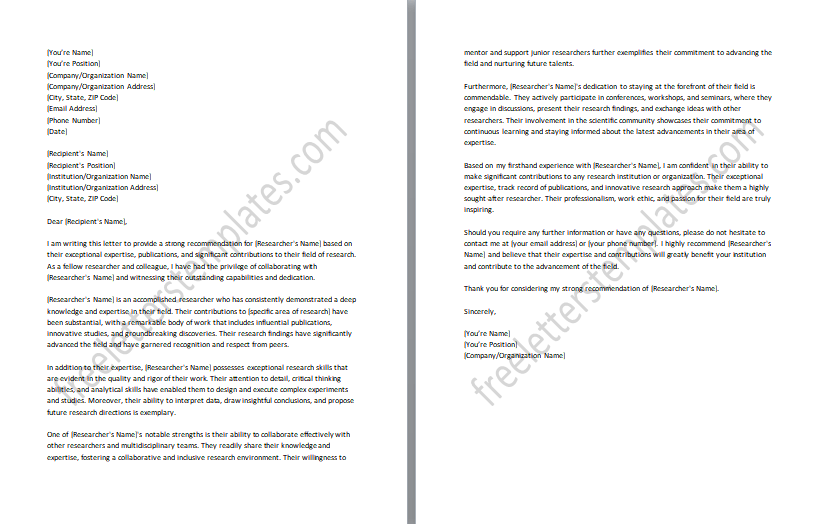
#13: Sales Letter:
A Sales Reference Letter is a recommendation that highlights the sales performance, relationship-building skills, and customer satisfaction of a salesperson. This is typically written by a satisfied customer or client who has experienced exceptional sales service from the individual. It emphasizes their professionalism, responsiveness, and the positive impact they have had on the customer’s buying experience. A well-crafted Sales can enhance the salesperson’s reputation, attract new customers, and build trust with potential clients. It serves as a testament to their sales acumen, customer-centric approach, and their ability to drive revenue growth through their sales efforts.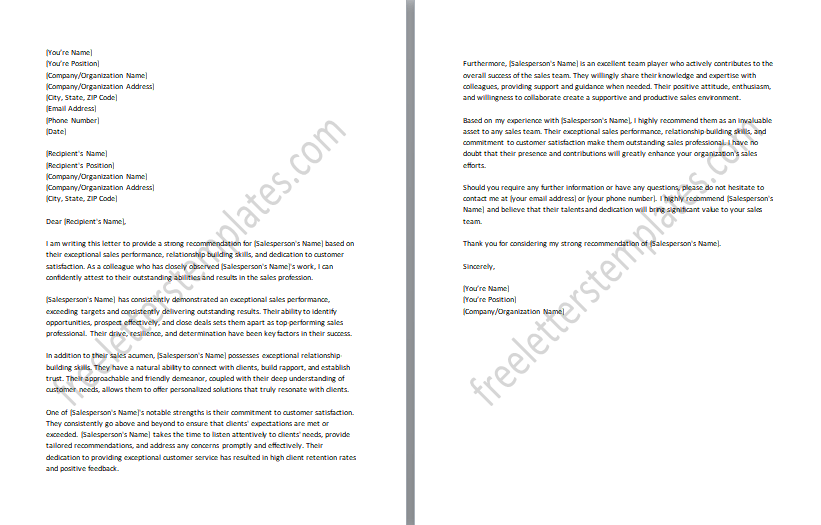
#14: Leadership Reference:
A Leadership Reference Letter is a recommendation that highlights an individual’s ability to motivate and inspire others, strategic thinking, and decision-making skills. This is typically written by a supervisor, colleague, or team member who has observed the individual’s leadership qualities firsthand. A well-crafted Leadership can enhance the person’s reputation as a leader, open doors to new opportunities, and showcase their potential to drive success in leadership roles. It serves as a testament to their leadership capabilities and their potential to inspire and empower others.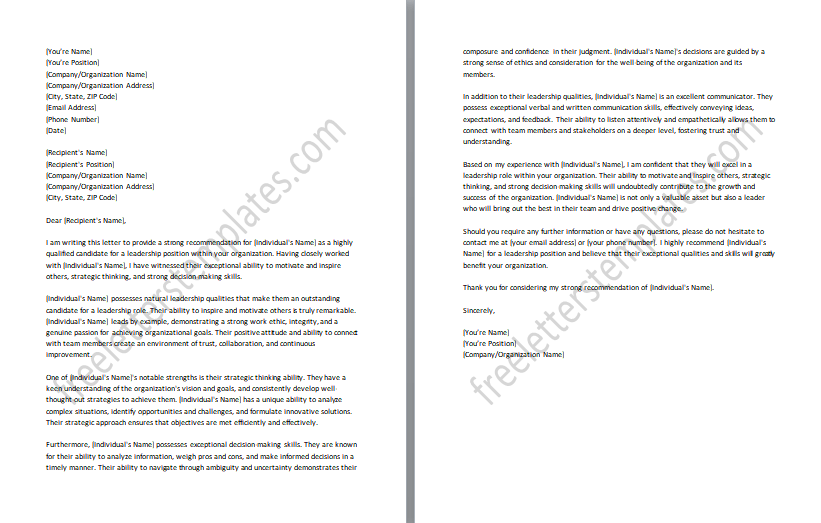
#15: Coaching Reference:
A Coaching Reference Letter is a recommendation that highlights the effectiveness of a coach or mentor in guiding and developing individuals or teams. This is typically written by a client or mentee who has directly benefited from the coach’s guidance and support. It emphasizes their ability to provide valuable insights, ask thought-provoking questions, and offer guidance that leads to positive outcomes. A well-crafted Coaching can enhance the coach’s reputation, attract new clients, and showcase their ability to inspire and empower others to reach their full potential.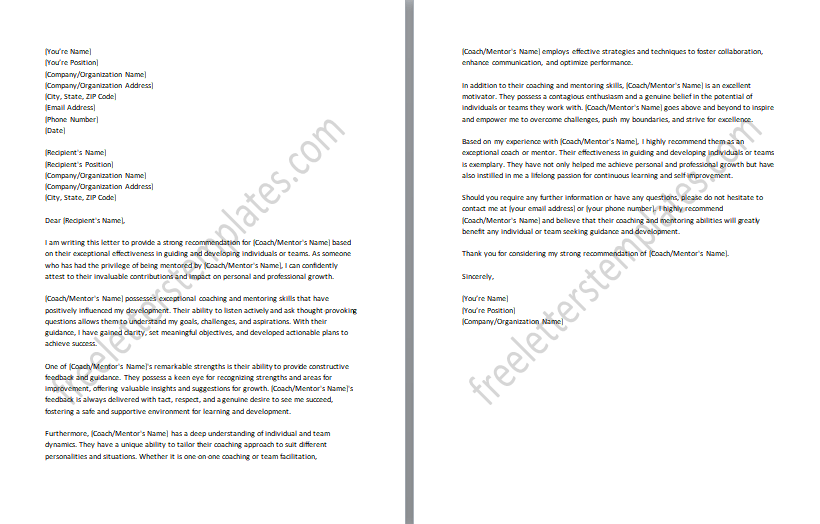
#16: Nonprofit Letter:
A Nonprofit Reference Letter is a heartfelt recommendation that shines a light on the incredible impact, transparency, and efficient use of resources of a nonprofit organization. The purpose of a Nonprofit is to share firsthand experiences of how the organization has made a meaningful difference in the community. It highlights their ability to bring about positive change, their responsible handling of resources, and their commitment to open communication. A well-crafted Nonprofit goes beyond words and serves as a testament to the organization’s unwavering dedication, inspiring others to support their noble cause.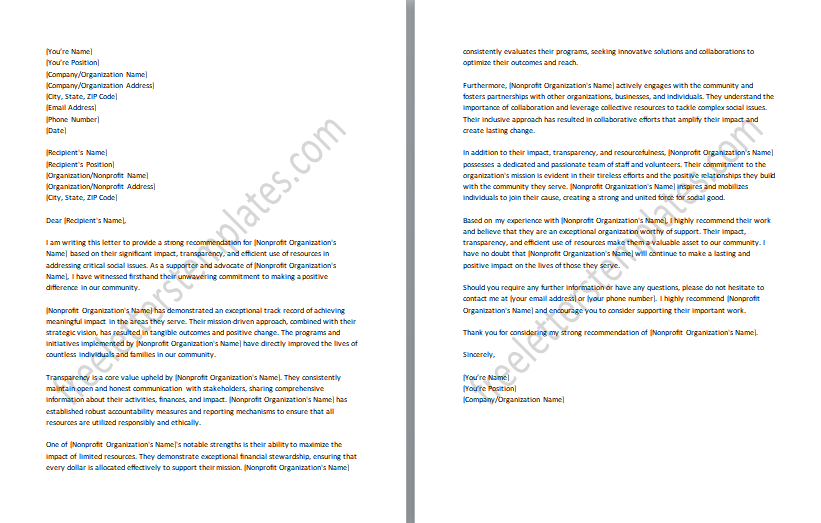
#17: Professional Development Reference:
A Professional Development Reference Letter is a recommendation that highlights the relevance, quality of content, and expert facilitators of a training program, workshop, or conference. This is typically written by an individual who has attended the professional development opportunity and experienced its benefits firsthand. The purpose of Professional Development is to provide feedback on the program’s effectiveness in enhancing knowledge, skills, and professional growth. It emphasizes the practicality of the content, the engaging and knowledgeable facilitators, and the overall impact on personal and career development. A well-crafted Professional Development can serve as a valuable endorsement, encouraging others to take advantage of the opportunity and further their professional development.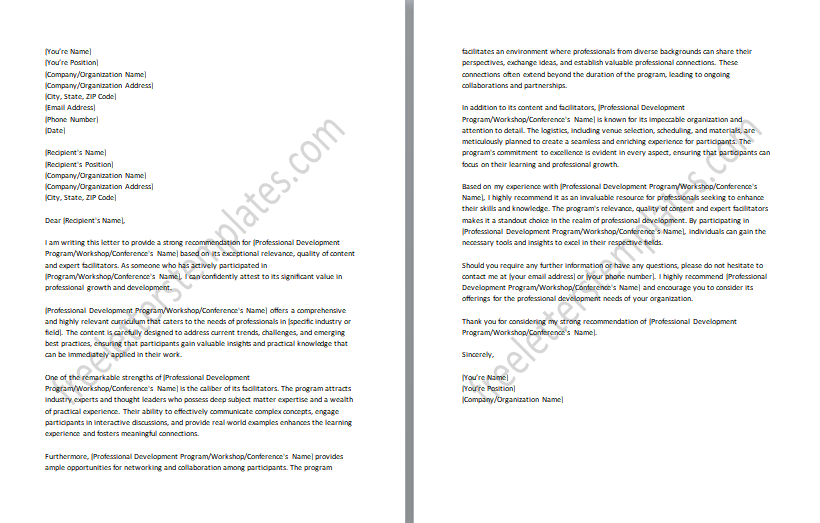
#18: Supplier Letter:
A Supplier Reference Letter is a recommendation that highlights the product quality, delivery reliability, and pricing of a supplier. This is typically written by a client or customer who has firsthand experience working with the supplier. The purpose of a Supplier is to provide feedback on the supplier’s performance, professionalism, and ability to meet client needs. It emphasizes the consistency of product quality, on-time delivery, and competitive pricing. A well-crafted Supplier can enhance the supplier’s reputation, attract new clients, and build trust with potential customers.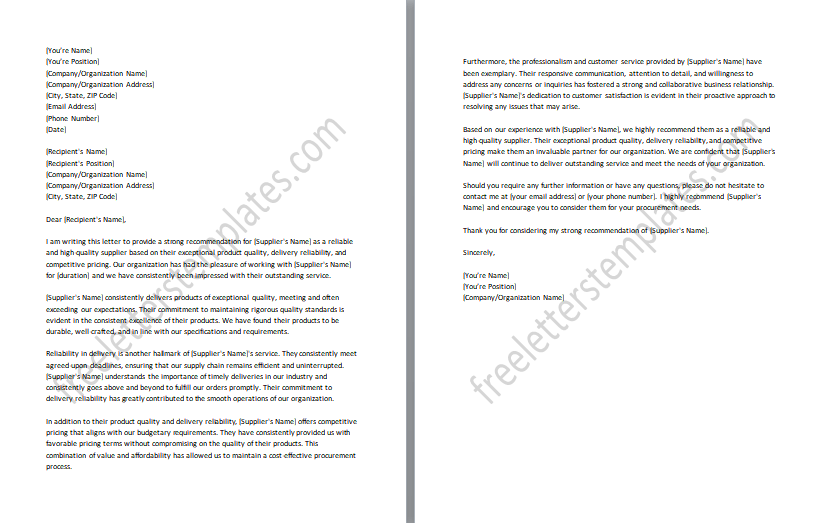
#19: Academic Research Reference:
An Academic Research Reference Letter is a recommendation that highlights the methodology, significance, and potential impact of a research project or study. The purpose of Academic Research is to provide insight into the researcher’s expertise, dedication, and contributions to their field. It emphasizes the rigor of their research methodology, the relevance and novelty of their findings, and the potential implications for further knowledge advancement. A well-crafted Academic Research can strengthen the researcher’s reputation, contribute to their academic recognition, and open doors to new research opportunities. It serves as a testament to their intellectual curiosity, innovative thinking, and the valuable insights they bring to their respective academic discipline.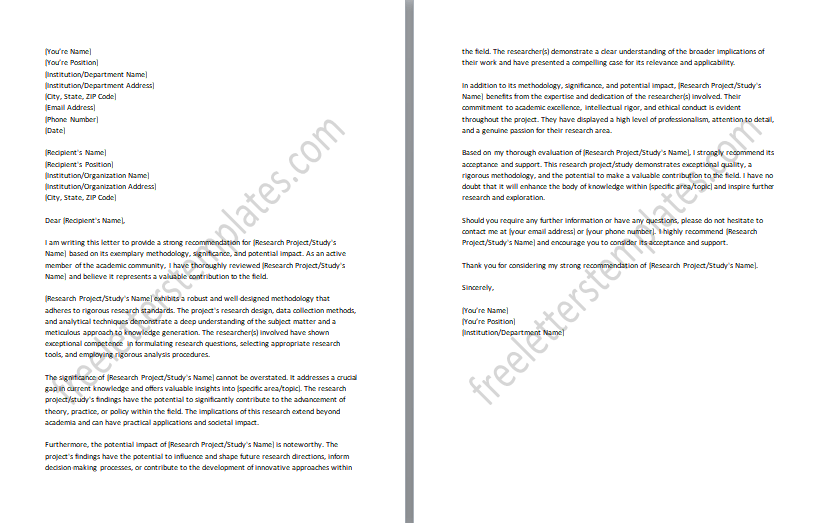
#20: Industry Association Reference:
An Industry Association Reference Letter is a recommendation that highlights the support, networking opportunities, and advocacy provided by an industry association. This is typically written by a member or representative of the association who has experienced firsthand the benefits of being a part of the organization. It emphasizes the resources, training programs, events, and networking opportunities offered by the association. A well-crafted Industry Association can enhance the association’s reputation, attract new members, and demonstrate its commitment to fostering professional growth and industry development.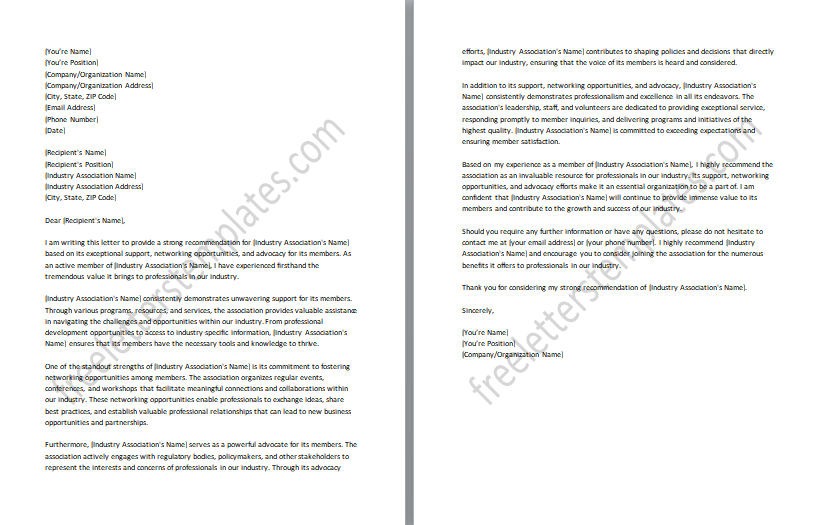
#21: Medical Professional Reference:
A Medical Professional Reference Letter is a recommendation that highlights the expertise, bedside manner, and patient care of a medical professional such as a doctor or nurse. This is typically written by a patient or colleague who has received medical care or worked closely with the professional. The purpose of a Medical Professional is to provide feedback on the individual’s medical knowledge, communication skills, and commitment to providing exceptional healthcare. A well-crafted Medical Professional can enhance the professional’s reputation, instill confidence in potential patients, and showcase their dedication to delivering high-quality healthcare services.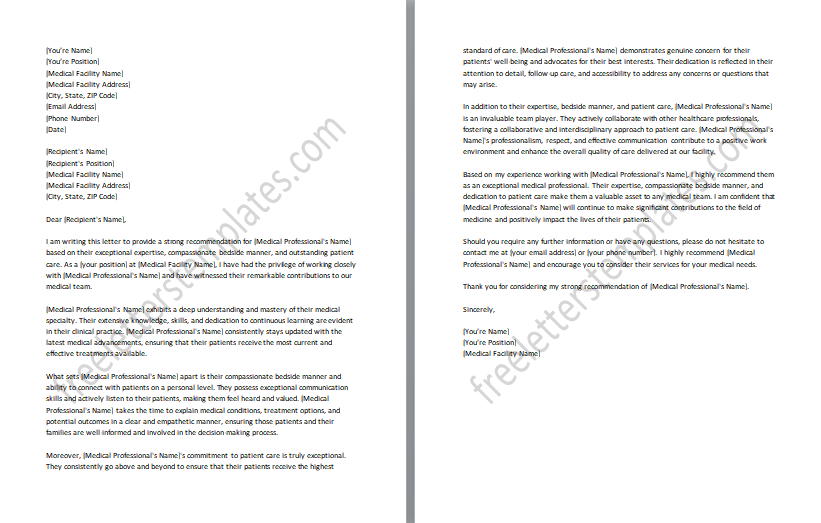
#22: Financial Reference:
A Financial Reference Letter is a recommendation that highlights the trustworthiness, knowledge, and customer satisfaction of a financial institution or professional, such as a banker or financial advisor. This is typically written by a client or customer who has firsthand experience working with a financial institution or professional. The purpose of a Financial is to provide feedback on the individual or institution’s financial expertise, integrity, and ability to meet the client’s financial needs. A well-crafted Financial can enhance the institution’s or professional’s reputation, attract new clients, and build trust with potential customers.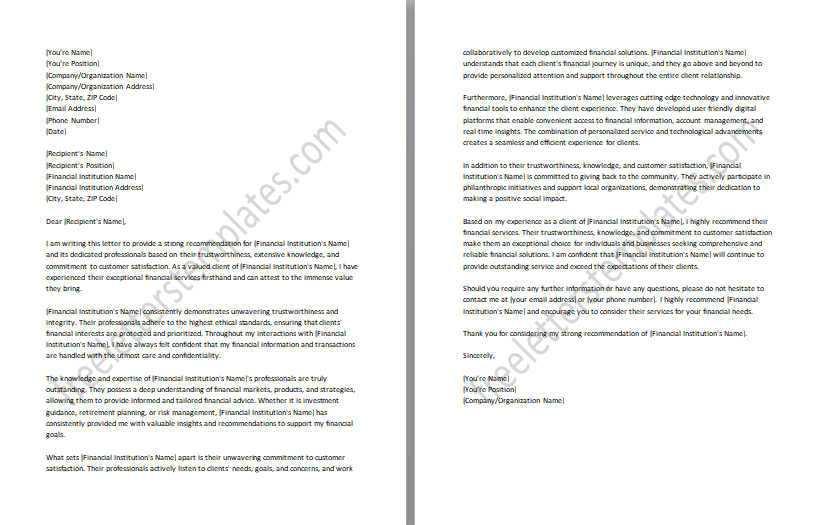
#23: Legal Letter:
A Legal Reference Letter is a heartfelt recommendation that showcases the legal expertise, professionalism, and courtroom skills of a legal professional, such as a lawyer or judge. This is typically written by a client, colleague, or someone who has witnessed the legal professional’s work firsthand. It emphasizes their strong advocacy skills, attention to detail, and their commitment to upholding justice. A well-crafted Legal can enhance the professional’s reputation, instill confidence in potential clients, and demonstrate their ability to provide effective legal representation.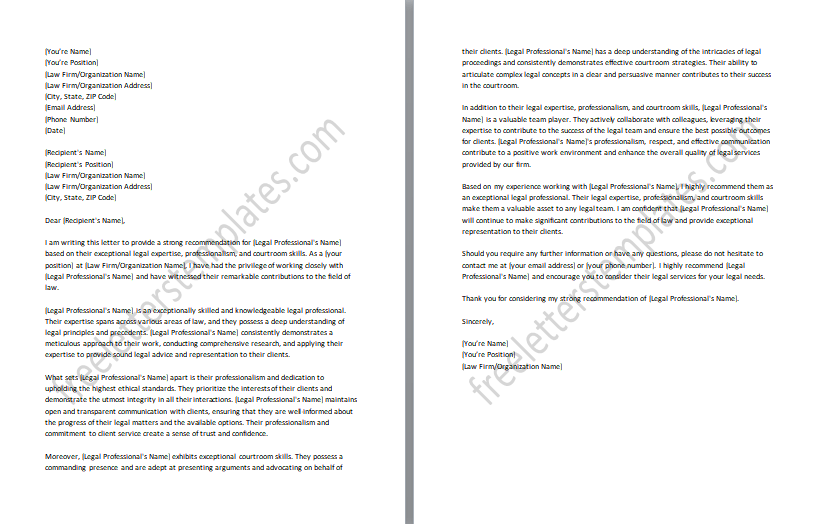
How to Use Reference Letters
- Job Applications: When applying for a job, carefully review the job requirements and identify the key skills and qualifications sought by the employer. Select reference letters that highlight your relevant skills and experiences. Include the reference letters in your application package, either by attaching them as separate documents or by mentioning them in your cover letter.
- Scholarship Applications: Scholarships often require strong letters of recommendation. Choose reference letters that speak to your academic achievements, leadership abilities, and commitment to your field of study. Follow the application guidelines provided by the scholarship committee and submit the reference letters along with your application materials.
- Professional Portfolios: If you maintain a professional portfolio to showcase your work and accomplishments, reference letters can add significant value. Scan or digitize the reference letters and include them as part of your portfolio. Organize them in a separate section and provide a brief introduction explaining their relevance to your professional journey.
- Networking and Informational Interviews: Reference letters can be valuable when networking or attending informational interviews. Bring printed copies of reference letters to share with professionals you meet. This demonstrates the credibility and positive feedback you have received from previous employers, colleagues, or mentors.
- Online Profiles and Websites: If you have an online professional profile or personal website, consider creating a section dedicated to reference letters. Scan or digitize the letters and upload them to your profile or website for potential employers, clients, or collaborators to access and review.
- Follow-Up Thank You Notes: After an interview or a professional interaction, consider sending a personalized thank you note to express your gratitude. Include a reference letter that speaks to your relevant skills and qualifications to reinforce the positive impression you made during the interaction.
Dos and Don’ts of Reference Letters:
For Requesters:
- Do Choose the right individuals: Select individuals who know you well and can speak to your abilities, skills, and character.
- Do provide ample notice: Give your reference writers sufficient time to craft a thoughtful letter by requesting their assistance well in advance.
- To provide the necessary information: Share relevant details about the opportunity or position you are applying for, along with your accomplishments and qualifications, to help the reference writer tailor the letter to your needs.
- Do express gratitude: Show appreciation for the time and effort your reference writer is investing in supporting your endeavors.
- Don’t assume consent: Always seek consent from potential reference writers before including their contact information or mentioning them as references.
- Don’t forget to follow up: Keep your reference writers informed about the outcome of your application process and express your gratitude for their support.
For Writers:
- Do gather information: Request the requester’s resume, achievements, and key points they want you to highlight to create a comprehensive and accurate reference letter.
- Do focus on specific examples: Provide specific instances that demonstrate the requester’s skills, accomplishments, and character traits.
- Do be truthful and objective: Present an honest assessment of the requester’s abilities and avoid exaggerations or false claims.
- Do maintain professionalism: Use formal language, adhere to appropriate formatting, and proofread the letter to ensure it is error-free and well-written.
- Don’t include personal biases: Base your evaluation solely on the requester’s professional attributes and avoid any personal biases or unrelated information.
- Don’t disclose confidential information: Respect confidentiality and refrain from sharing sensitive or confidential details without the requester’s consent.
Conclusion
In conclusion, professional reference letters play a significant role in various aspects of our professional lives. Whether it’s applying for a job, seeking educational opportunities, or advancing in our careers, reference letters provide valuable insights and endorsements from trusted sources. By showcasing an individual’s skills, qualifications, character, and achievements, reference letters serve as powerful tools that enhance credibility, differentiate candidates, and open doors to new opportunities. When utilized effectively, reference letters can leave a lasting impression on employers, admissions committees, and decision-makers, influencing their perception of an individual’s potential and suitability. Therefore, understanding the importance of reference letters and following best practices in requesting and writing them can greatly contribute to our overall professional success.